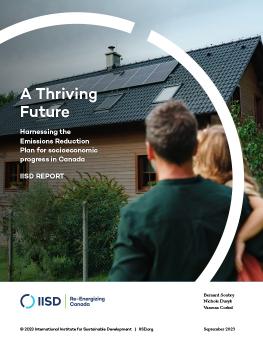
A Thriving Future
Harnessing the Emissions Reduction Plan for socio-economic progress in Canada
Canada's Emissions Reductions Plan is its most recent roadmap to decarbonization—but effective climate policy needs safeguards to ensure positive social and economic impacts. This analysis shows that while reducing emissions is essential to socio-economic benefits in Canada, some policies need additional safeguards to ensure that they help reduce poverty and inequality.
-
Canada's Emissions Reduction Plan (ERP) is an ambitious roadmap to lowering emissions and an opportunity to increase equity for all Canadians.
-
Canada's Emissions Reduction Plan (ERP) is an ambitious roadmap to lowering emissions and an opportunity to increase equity for all Canadians.
-
Research shows that climate policies can be beneficial for social and economic equity when they 1) include social safeguards like worker protections, 2) specifically target lower-income groups, and 3) include equity-deserving stakeholders in project design.
- Canada’s Emissions Reduction Plan (ERP) is an ambitious roadmap to lowering emissions and an opportunity to increase equity for all Canadians.
- We analyzed a sample of 67 out of the ERP’s 129 policies and found that measures have vastly different impacts: while some can help reduce poverty and inequality, as well as carbon emissions, many others need social and economic safeguards to preserve equity and raise social standards across the board.
- Reducing emissions will create the greatest socio-economic good in the long run. Updates to the ERP are an opportunity to set out conditions for funding that would tie investments in decarbonization to positive social outcomes.
- We recommend that the government integrate a poverty and inequality analysis into future climate policy development, increase support for measures that can maximize positive social impact and mitigate potentially negative impacts, and ensure that climate policy includes social safeguards. Future updates of the ERP can help reduce poverty and inequality in Canada.
Participating experts
Funded by
You might also be interested in
December 2024 | Carbon Minefields Oil and Gas Exploration Monitor
In November 2024, 23 oil and gas exploration licences were awarded across five countries, with Russia granting the licences that account for the largest portion of embodied emissions.
The Cost of Fossil Fuel Reliance
Government support for fossil fuels reached at least USD 1.5 trillion in 2023, new data shows.
Increased Support Needed to Achieve India's Clean Energy Goals
India is on track to achieve many of its 2030 clean energy goals but needs to step up government support measures to accelerate the deployment of offshore wind, electric vehicles, and green hydrogen, according to a new report.
Budgeting for Net Zero
This study estimates the cost gap for battery energy storage systems (BESSs), offshore wind, solar photovoltaic (PV), electric vehicles (EVs), and green hydrogen (GH2) to inform government support.